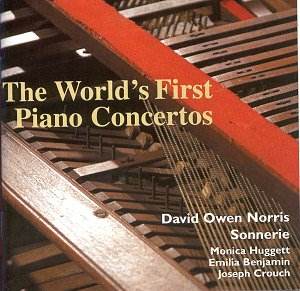|
This CD champions the
square piano, that instrument of the 1770s
which introduced the keyboard to a wide
amateur audience. The problem with the
Square piano is that the dampers were
raised by two hand levers (one each for
treble and bass) rather than a sustaining
pedal, and thus it was characterised by
what pianist David Owen Norris describes
as a "halo of resonance". This
characteristic has been seen as a fatal
disadvantage in assessing the square piano
as having a serious role in playing the
repertoire of the day.
In this programme of
Piano Concertos played on a restored Zumpe
& Buntebart square piano of 1769,
David Owen Norris triumphantly demonstrates
how the birth of the piano concerto in
the London of the 1770s can be experienced
in the music of J.C. Bach - the "London
Bach", Carl Friedrich Abel; James
Hook (the bard of Vauxhall Gardens - recorder
players will probably have encountered
his music among their first "proper"
sonatas) and Philip Hayes, Professor of
Music at Oxford. The latter, Norris reminds
us, was renowned as the fattest man in
England. More importantly, Norris argues
that Hayes’ Concerto in A major of 1769
can be regarded as the world’s first.
One can well see how spare the textures
of the concerto would sound if played
on a modern piano, or on a harpsichord,
yet here they take on a persuasive and
idiomatic character all their own.
The ensemble supporting
David Owen Norris at the square piano,
consists of two violins and cello. They
are recorded in the Music Room at Hatchlands,
the home of the Cobbe Collection at the
National Trust property at Hatchlands
Park, Surrey. The microphone catches the
ensemble persuasively. The performances
are poised and crisp, Norris scaling his
pianism perfectly to the instrument. If
one responds most immediately to the J.C.
Bach Concertos, this is an enjoyable exploration
of the music that would have been on offer
to the active music lover in the London
of the 1770s.
In his fascinating and
erudite booklet notes Norris draws our
attention to J.C. Bach’s Sonata in D,
which in the hands of the young Mozart
became the latter’s Concerto in D K107.
For this Norris plays another square piano,
built by Zumpe in 1777 or 1778. This still
has the original buckskin hammer-covers,
and as Norris notes, this means it cannot
be played very frequently. Signed on the
soundboard by J.C. Bach, it is exciting
to realise that it is very probable that
both Bach and Mozart played it. In the
face of this we may applaud Norris waxing
almost lyrical in the conclusion to his
notes, writing: "It seems certain
that this autographed piano, found near
St Germain, was taken there by Bach on
his 1778 visit and ... in this case Mozart
would have certainly played it. ... For
his own concerts in 1772 Mozart arranged
three of Bach’s Op.5 Piano Sonatas as
Concertos, with accompaniment for string
trio. ... what better than to play one
of these works of homage from the young
composer to his mentor on the very keys
both composers touched together in that
long-ago summer of ’78?" Makes you
want to stand up and cheer, doesn’t it?
The sound and the playing
live up to ones expectations. Try the
catchy first movements of the Abel or
the Hook concertos to see if it is for
you. For me this is practical musicology
at its best, at once enjoyable and enlightening.
It is also one of the longest-playing
CDs to have come my way
Lewis Foreman
|

![]() for details
for details